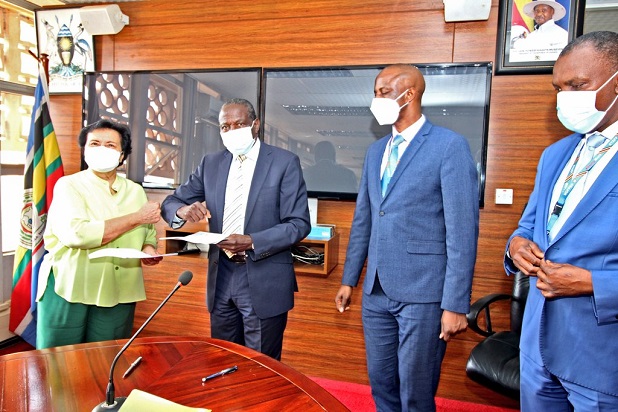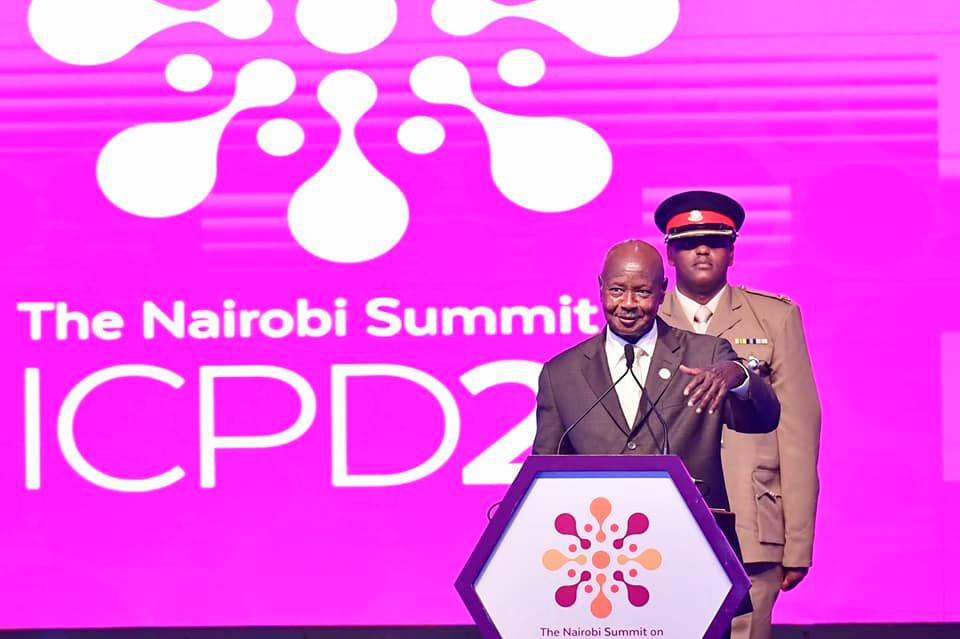Minister Kasaija (2nd L) with investor Enrica Pinetti (left) after signing the agreement. Looking on (2nd Right) is Ramathan Ggoobi, PS, Ministry of Finance
Parliament is expected to take a decision on the controversial coffee deal signed between Ministry and Finance and Enrica Pinetti the proprietor of Uganda Vinci Coffee Company tomorrow.
This is after Parliament’s Trade Committee completed its probe into the deal that has been criticized by Ugandans.
Mwine Mpaka, the Chairperson of Trade Committee, took to his twitter handle saying: “The parliamentary committee on trade has concluded investigations into the coffee agreement and will be ready to present its findings and recommendations on 3rd May 2022 (tomorrow). We appreciate all stakeholders who supported us during this investigation,” wrote Mwine.
Asked to highlight some of the resolutions taken by the Committee in a phone interview, Mwine was tight-lipped, saying, “I can’t share resolutions. It’s still a parliament document until it has been laid on table then it becomes a public document.”
Meanwhile, Civil society group led by Southern and Eastern Africa Trade Information and Negotiations Institute (SEATINI) Uganda have scoffed at the proposed 246 jobs that will be created by Vinci company, saying the agreement falls short of detailing the kinds of jobs Ugandans will get.
While appearing before the Trade Committee, Jane Nalunga, the SEATINI Uganda boss, argued that Uganda has been struggling with unemployment rates which increased to 2.44% in 2020 from 1.8% in 2019, and tasked Government to ensure that opportunities are created for Ugandans in order to reduce the employment.
“We don’t know whether these are the total employee jobs created together with those ones who are going to come from outside or Ugandans, but we have seen a number of companies which have been given a lot of tax incentives and you can see the way they treat our people. There is a lot of casualisation labour, our people aren’t given contracts and that means that government can’t recoup some money through pay as you earn,” said Nalunga.
Civil Society activists now want Parliament to ensure that the ratio of Ugandans who will be employed are clearly stated in the coffee agreement.
Nalunga also asked the Trade Committee to investigate how Vinci Company came to win tax exemptions, including those barred in the laws citing section 12 of the Investment Code Act that provides for minimum capital investment required for a foreign investor to qualify for incentives, yet in the agreement, there is no mention on the capital requirement that Vinci has to qualify for the incentives.
She warned the Committee that the extreme tax waivers will affect Uganda’s struggling economy remarking, “This is really sticky and these exemptions are given to one company not the entire sub-sector, it is creating monopoly, it is creating unfair competition, but government is also losing allot of money at this time when we are indebted and domestic resource moblisation is weak and economy is recovering from Covid.”
According to Nalunga, there is no justification for Government to award one player in the sector with all these incentives and if it is to go ahead, then the incentives should be derived from the current laws.
It should be recalled that Speaker Anita Among ordered a probe into the controversial coffee following a petition by some opposition MPs demanding a review into the contract.
In the controversial agreement, Uganda Vinci Coffee Company was handed the monopoly over the purchase and export of premium coffee from Ugandan farmers, which powers would see the company with the sole decision to determine the price of coffee.
Pinetti was also given a 10 year tax holiday including paying import duties, value-added taxes, excise duty, stamp duty and corporate income tax, and for mandatory taxes that the company can’t avoid, these will be borne by Ugandan taxpayers.
Pinetti is the same developer behind the controversial multi-million dollar construction of the International Specialised Hospital, after Ministry of Finance gifted her promissory notes to a tune of US$379 million (about Shs1.4Trn) and Shs348Bn has already been advanced, but no tangible works have taken place at the construction site in Lubowa.





